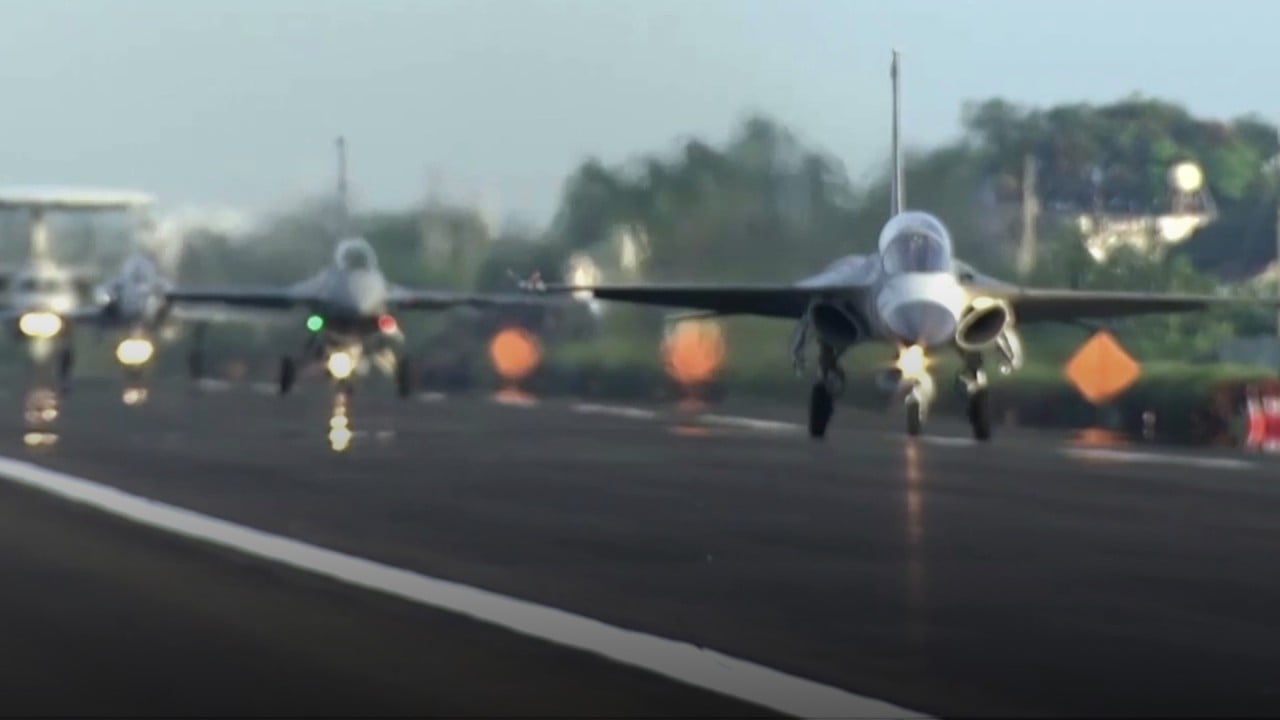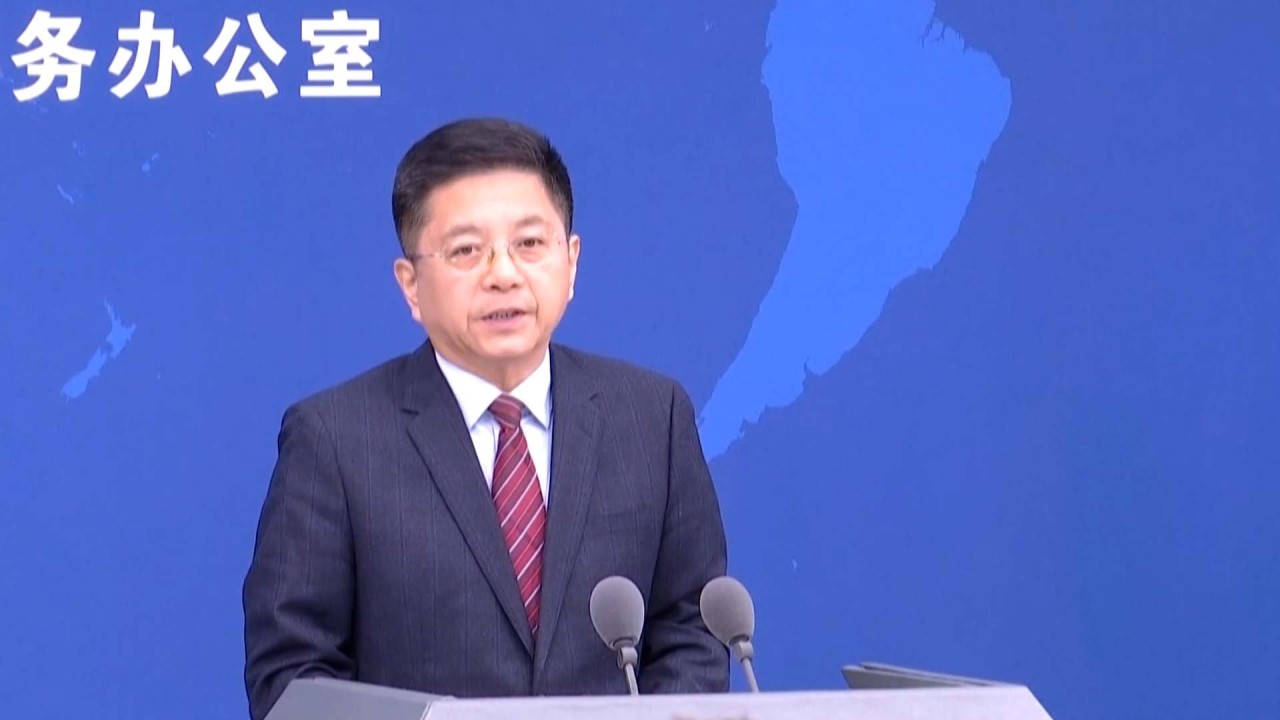Beijing pushes back at US troops on Taiwan but no sudden move expected
- Tsai Ing-wen’s revelation is unlikely to lead to any drastic move, but military preparations against the island may intensify
- Taiwanese officials move quickly to downplay her remarks, which analysts describe as a ‘serious provocation’

Beijing is expected to step up its military preparations against Taiwan but is unlikely to make any drastic move in response to the revelation – delivered for the first time by Taiwanese President Tsai Ing-wen – that US troops are on the self-ruled island.
In an interview aired on Wednesday by CNN, Tsai also declared she believed the US would help to defend the island in the event of an attack. Washington maintains that its long-held policy of strategic ambiguity – a refusal to explicitly state whether it would take military action for Taiwan – on the issue is unchanged.
Taiwan officials moved quickly to downplay Tsai’s remarks. Defence Minister Chiu Kuo-cheng stressed the US troops were not stationed on the island. “There are military exchanges between Taiwan and the US and in such exchanges several of their people have come here to help in our training. This is not a garrison.”
He also said the purpose of the exchanges was to strengthen the island’s defence capability. “Though assistance from any friendly country or group would have certain help for Taiwan, in the event of safeguarding our country we should not rely on others.”
Chinese defence ministry spokesman Tan Kefei said on Thursday China had already protested to the US about its military ties with Taiwan. “If the US continues to stubbornly cling to the illusion of ‘using Taiwan to contain China’ and attempts to substantially enhance US-Taiwan military ties bit by bit, China will resolutely counter and fight back,” he said.
Tsai would not say exactly how many US military personnel are currently on the island, but said it was “not as many as people thought”. In confirming what has long been reported, she explained that Taiwan had a “wide range of cooperation with the US aimed at increasing our defence capability”.
Mainland observers said Beijing would take the first official confirmation of a US military presence on the island as a highly provocative move.
Beijing opposes any military ties between the US and Taipei and has reacted furiously to arms sales and other military exchanges, regarding them as boosting support for Taiwanese pro-independence forces, and a violation of its sovereignty.
In a speech on October 9, President Xi Jinping said peaceful “reunification” remained in the “interests of the Chinese nation, including our compatriots in Taiwan”. Those who opposed reunification would be judged by history, he added.
Song Zhongping, a former PLA instructor and military affairs commentator, said Tsai’s revelation was a serious provocation to Beijing. “By revealing the US troops’ presence in Taiwan, Tsai is saying that Taiwan has the backing of the US so the PLA should not act rashly. This is a serious political and military provocation.”
Beijing would stick to peaceful reunification and solicit Taiwanese public support, he predicted. “But, on the other hand, mainland China will step up preparations for a military struggle with the US.”
Chinese foreign ministry spokesman Wang Wenbin said the US kept sending “wrong signals” to Taiwan pro-independence forces but that reunification was the only way forward. “Those who separate the nation will never have a good ending. There will only be a dead end for those seeking Taiwan independence,” he told a press conference on Thursday.
Earlier, Hu Xijin, the editor-in-chief of Chinese state-run tabloid Global Times, reacted to the news by saying Chinese military forces would launch a war to eliminate and expel the US soldiers.
But Zhu Songling, a professor with the Institute of Taiwan Studies at Beijing Union University, said Beijing’s strategy on Taiwan would not change drastically.
“Even if we resolve the Taiwan issue by war or other methods, there is still the problem of development. There would still be issues concerning the containment against China in the world that we need to face,” he said.
“So now it seems that China should seize the period of strategic opportunity to promote development … then it may consider the issue of adjusting the strategy.”

00:00
Taiwan denounces mainland China for ‘over the top’ flights into island’s air defence zone
Wang Kung-yi, director of Taipei-based think tank Taiwan International Strategy Study Society, said Tsai’s message served as “a checkmate to the US over its use of the strategic ambiguity policy in dealing with the mainland”.
“Tsai thought it should be the time to gradually turn ambiguity to clarity, which she believed would help promote Taiwan’s security,” Wang said. Another reason, he added, was “to see how the US and mainland China will react, now that she has made clear the American military presence in Taiwan”.
There have been previous, unconfirmed reports about US troops in Taiwan. Last November, the island’s defence ministry said a contingent of marines had arrived at the invitation of Taiwan’s military to train its troops. But the statement was quickly retracted, a move which analysts said reflected the sensitivity of the issue.
Tensions between China and the US over Taiwan have been escalating and the PLA has dramatically stepped up its pressure on the island, sending more than 150 military aircraft into its air defence zone in the first week of October.

01:15
China insists Taiwan has no right to join United Nations
For the first time on Tuesday, a Z-10 attack helicopter and an Mi-17 transport chopper joined five other aircraft in their regular drill near Taiwan – a configuration that could be used to seize the island.
Also on Tuesday, US Secretary of State Antony Blinken triggered a protest from Beijing when he supported Taiwan’s participation in the United Nations system. And last week, Biden said the US was committed to Taiwan’s defence if there was an attack from the mainland. Beijing protested and US officials clarified that there had been no change in policy.
Lu Yeh-chung, a professor of diplomacy at National Chengchi University in Taipei, said Tsai had meant to tell Beijing that Taiwan-US relations had already grown beyond the unofficial level.
“Tsai also meant to tell Taiwanese people that Taiwan has a military cooperation with the US and therefore in fighting against the enemy, the US is at the back of Taiwan,” he said.
Additional reporting by Minnie Chan and Catherine Wong